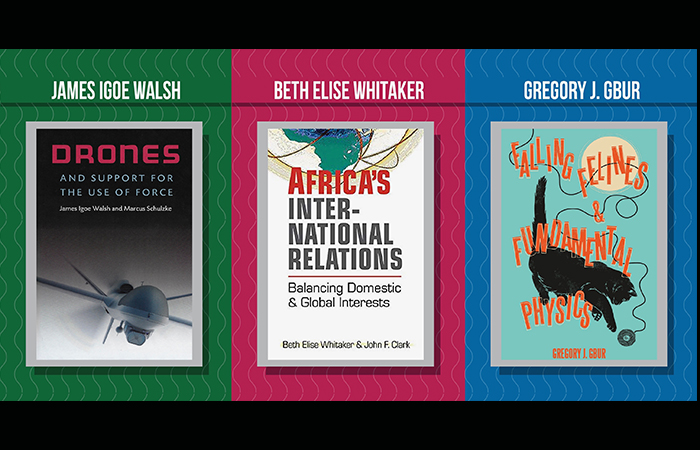The Personally Speaking published experts series in its 11th season looked at drones, cats, and Africa. Three UNC Charlotte scholars/researchers in 2020-2021 talks discussed books they have written and how they came to write them during the annual series presented by UNC Charlotte’s College of Liberal Arts & Sciences, J. Murrey Atkins Library, and The Dubois Center at UNC Charlotte Center City.
“We offer this series to engage the community in conversations about relevant topics considered in books written by our faculty,” said Nancy A. Gutierrez, dean of the College of Liberal Arts & Sciences. “Not only is this a way for us to connect with the community, but it also is a way to share knowledge and spark discussion.”
Due to uncertainties related to the COVID-19 pandemic, the events in the 2020-2021 season were virtual presentations, with opportunities for online engagement by the audience from around the world with the authors. Films of the talks are available on the College’s YouTube channel.
James Igoe Walsh presented on Wednesday, September 30, 2020 on his book, Drones and Support for the Use of Force, which he wrote with co-author Marcus Schulzke.
Combat drones offer an unprecedented ability to reduce the costs of conflict by increasing accuracy, reducing the risks to civilians, and protecting military personnel from harm. The advantages should make drone strikes more popular than operations involving ground troops. Yet many critics believe drone warfare will make political leaders too willing to authorize wars, weakening constraints on the use of force.
Walsh, a professor in the Department of Political Science and Public Administration in UNC Charlotte’s College of Liberal Arts & Sciences, was awarded the First Citizens Bank Scholars Medal for 2020. His research interests include armed conflict and civil wars and international security cooperation and conflict. His work has been published by Columbia University Press, the Journal of Conflict Resolution, International Studies Quarterly, among others. Walsh serves as Lead Principal Investigator on the U.S. Defense Department’s Minerva Research Initiative grant supporting a “Resources and Conflict” project.
Co-author Schulzke is a lecturer in international relations at the University of York, United Kingdom.
Beth Elise Whitaker presented on Wednesday, October 28, 2020, on her book, Africa’s International Relations: Balancing Domestic and Global Interests, which she co-authored with John F. Clark.
Why do African leaders cultivate ties with some foreign powers and not others? How do civil conflicts in African countries at times expand to engulf entire regions of the continent? Why have leaders enhanced the capabilities of international organizations like the African Union while undermining the authority of bodies such as the International Criminal Court?
Whitaker is a professor and director of the honors program in the Department of Political Science and Public Administration in UNC Charlotte’s College of Liberal Arts & Sciences. As a Fulbright Scholar in Kenya in 2005-2006, she examined U.S.-African counter-terrorism cooperation. She also has done fieldwork in Tanzania and Botswana. More recently, with a U.S. Department of Defense grant, Whitaker and colleagues have studied how rebel groups’ illicit funding strategies influence the dynamics of civil conflict. Whitaker worked previously at the Brookings Institution and the American Council on Education.
Co-author Clark is a professor of politics and international relations at Florida International University.
Gregory J. Gbur presented on “Falling Felines and Fundamental Physics” on Tuesday, February 23, 2021.
The question of how cats always land on their feet has long intrigued humans. Attempts to understand the cat righting reflex have provided crucial insights into puzzles in mathematics, geophysics, neuroscience, and human space exploration. There is an explanation, but the finer details still inspire heated arguments. And, as with other cat behavior, the more we investigate, the more surprises we discover.
Gbur is a cat parent. He also is a physicist who specializes in the study of classical coherence theory in optical physics and a professor in the Department of Physics and Optical Science in UNC Charlotte’s College of Liberal Arts & Sciences. Gbur runs two different blogs about science and other topics: Skulls in the Stars: The intersection of physics, optics, history, and pulp fiction, and Science Chamber of Horrors: Presenting the freakiest and most terrifying aspects of science, scientists, and nature- currently on hiatus.








